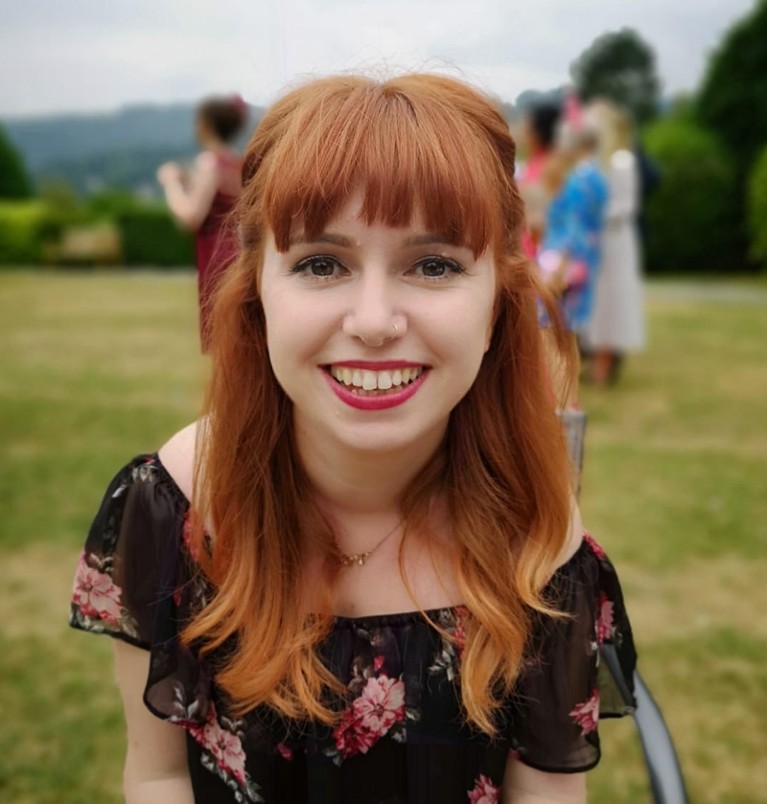
Credit: Calysta Bleasby
Isobel Williams, a clinical neuroscientist at the University of Sheffield, UK, is a founding member of the Disabled and Ill Researchers’ Network at the same institution. As a researcher with a long-term health condition, she has helped to build a support group and community for disabled PhD students, postdoctoral researchers and faculty members.
How does your condition affect your life?
I’ve had juvenile idiopathic arthritis, an autoimmune disease with no known cause, since I was four years old. After I received my undergraduate degree from the University of Sheffield, it got so bad that I had to take a year out to get both of my hips replaced. I am in pain every day and expect to need further surgeries because of the arthritis. Sometimes, I experience a flare-up — transient worsening of my symptoms — that can last for a day or even weeks.
Has your condition influenced your career?
After I earned a master’s degree in cognitive neuroscience at Birkbeck, University of London, I gained clinical experience as a carer. I then returned to Sheffield to study medically unexplained neurological disorders, including psychogenic non-epileptic seizures, and how they relate to emotional and psychological factors. I’m keenly aware of the links between emotional and physical health, and bring a perspective to this research that others might not have. I’m working on a clinical trial that is looking at whether a nutritional intervention can prolong life in people with amyotrophic lateral sclerosis (also known as motor neuron disease). I’d like to pursue work as a clinical psychologist alongside my research. I’m particularly interested in helping people who have functional and movement disorders.
Would you consider moving to another country?
I would love to work abroad. The main barrier to that is my health. I see a general practitioner regularly, take medications and consult a specialist twice a year — I rely heavily on the UK National Health Service to keep me going. If someone offered me a dream postdoc position in the United States, for example, I would consider it, but would have real concerns about health insurance — specifically, what my pre-existing conditions would mean for the type of health coverage that I could afford.
Have you experienced any discrimination?
Sheffield is a great place with a lovely work environment and existing support structures, but there is a general lack of awareness about disability that is not unique to the institution. For example, I have a disabled-parking permit, but people leave notes on my car that say I shouldn’t be parking in a space for disabled people.
How did the Disabled and Ill Researchers’ Network form?
I was ranting about these types of encounter at the pub with a colleague, Kay Guccione, who had already helped to set up networks for postgraduate parents and for researchers whose work is emotionally demanding. She helped to bring together PhD students who have disabilities. There are now around 50 of us, and we’re still growing. We meet every three months and have a Google community and an e-mail list. We also share our experiences on social media using the hashtags #chronicallyacademic or #PhDisabled. The idea is to provide peer support, so that members know that there are others like them out there. Higher education has conventionally been able-bodied, but we now have more diversity, and that includes disabilities. We are working with the university administration at Sheffield to improve the process of applying for health-related leaves of absence for those with a chronic condition.
What is your advice for people who wish to create a similar network at their institution?
Create a website for the network, and invite people at your university who have a disability or illness to write a piece about their experiences of managing their PhD or postdoc. Because many conditions can be hidden, I also advise students, no matter where they are studying, to disclose their condition to their advisers and to set up boundaries and reasonable adjustments — for example, the need for regular breaks during the day or ruling out weekend work — that are necessary to protect their health. I’d also like people to feel comfortable with their disability. It’s a sign of strength to have got this far in academia while facing extra obstacles.

 Subject to reflection
Subject to reflection
 Equality: The fight for access
Equality: The fight for access
 Turning Point: Collin Diedrich
Turning Point: Collin Diedrich





